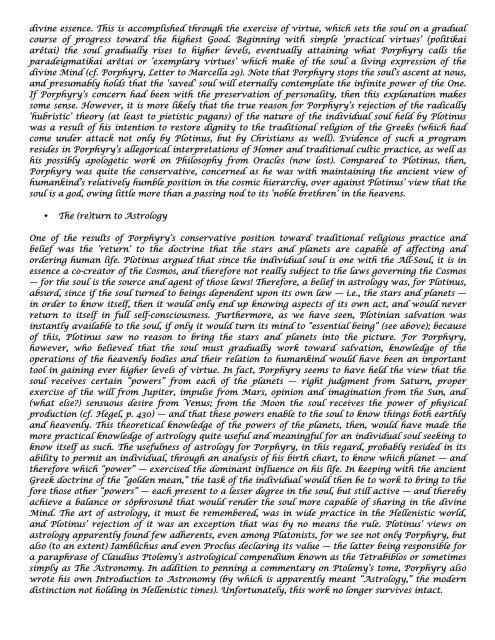Neo-Platonism - Grand Lodge Bet-El
Neo-Platonism - Grand Lodge Bet-El
Neo-Platonism - Grand Lodge Bet-El
Create successful ePaper yourself
Turn your PDF publications into a flip-book with our unique Google optimized e-Paper software.
divine essence. This is accomplished through the exercise of virtue, which sets the soul on a gradual<br />
course of progress toward the highest Good. Beginning with simple ‘practical virtues’ (politikai<br />
arêtai) the soul gradually rises to higher levels, eventually attaining what Porphyry calls the<br />
paradeigmatikai arêtai or ‘exemplary virtues’ which make of the soul a living expression of the<br />
divine Mind (cf. Porphyry, Letter to Marcella 29). Note that Porphyry stops the soul’s ascent at nous,<br />
and presumably holds that the ‘saved’ soul will eternally contemplate the infinite power of the One.<br />
If Porphyry’s concern had been with the preservation of personality, then this explanation makes<br />
some sense. However, it is more likely that the true reason for Porphyry’s rejection of the radically<br />
‘hubristic’ theory (at least to pietistic pagans) of the nature of the individual soul held by Plotinus<br />
was a result of his intention to restore dignity to the traditional religion of the Greeks (which had<br />
come under attack not only by Plotinus, but by Christians as well). Evidence of such a program<br />
resides in Porphyry’s allegorical interpretations of Homer and traditional cultic practice, as well as<br />
his possibly apologetic work on Philosophy from Oracles (now lost). Compared to Plotinus, then,<br />
Porphyry was quite the conservative, concerned as he was with maintaining the ancient view of<br />
humankind’s relatively humble position in the cosmic hierarchy, over against Plotinus’ view that the<br />
soul is a god, owing little more than a passing nod to its ‘noble brethren’ in the heavens.<br />
• The (re)turn to Astrology<br />
One of the results of Porphyry’s conservative position toward traditional religious practice and<br />
belief was the ‘return’ to the doctrine that the stars and planets are capable of affecting and<br />
ordering human life. Plotinus argued that since the individual soul is one with the All-Soul, it is in<br />
essence a co-creator of the Cosmos, and therefore not really subject to the laws governing the Cosmos<br />
— for the soul is the source and agent of those laws! Therefore, a belief in astrology was, for Plotinus,<br />
absurd, since if the soul turned to beings dependent upon its own law — i.e., the stars and planets —<br />
in order to know itself, then it would only end up knowing aspects of its own act, and would never<br />
return to itself in full self-consciousness. Furthermore, as we have seen, Plotinian salvation was<br />
instantly available to the soul, if only it would turn its mind to “essential being” (see above); because<br />
of this, Plotinus saw no reason to bring the stars and planets into the picture. For Porphyry,<br />
however, who believed that the soul must gradually work toward salvation, knowledge of the<br />
operations of the heavenly bodies and their relation to humankind would have been an important<br />
tool in gaining ever higher levels of virtue. In fact, Porphyry seems to have held the view that the<br />
soul receives certain “powers” from each of the planets — right judgment from Saturn, proper<br />
exercise of the will from Jupiter, impulse from Mars, opinion and imagination from the Sun, and<br />
(what else?) sensuous desire from Venus; from the Moon the soul receives the power of physical<br />
production (cf. Hegel, p. 430) — and that these powers enable to the soul to know things both earthly<br />
and heavenly. This theoretical knowledge of the powers of the planets, then, would have made the<br />
more practical knowledge of astrology quite useful and meaningful for an individual soul seeking to<br />
know itself as such. The usefulness of astrology for Porphyry, in this regard, probably resided in its<br />
ability to permit an individual, through an analysis of his birth chart, to know which planet — and<br />
therefore which “power” — exercised the dominant influence on his life. In keeping with the ancient<br />
Greek doctrine of the “golden mean,” the task of the individual would then be to work to bring to the<br />
fore those other “powers” — each present to a lesser degree in the soul, but still active — and thereby<br />
achieve a balance or sôphrosunê that would render the soul more capable of sharing in the divine<br />
Mind. The art of astrology, it must be remembered, was in wide practice in the Hellenistic world,<br />
and Plotinus’ rejection of it was an exception that was by no means the rule. Plotinus’ views on<br />
astrology apparently found few adherents, even among Platonists, for we see not only Porphyry, but<br />
also (to an extent) Iamblichus and even Proclus declaring its value — the latter being responsible for<br />
a paraphrase of Claudius Ptolemy’s astrological compendium known as the Tetrabiblos or sometimes<br />
simply as The Astronomy. In addition to penning a commentary on Ptolemy’s tome, Porphyry also<br />
wrote his own Introduction to Astronomy (by which is apparently meant “Astrology,” the modern<br />
distinction not holding in Hellenistic times). Unfortunately, this work no longer survives intact.
















